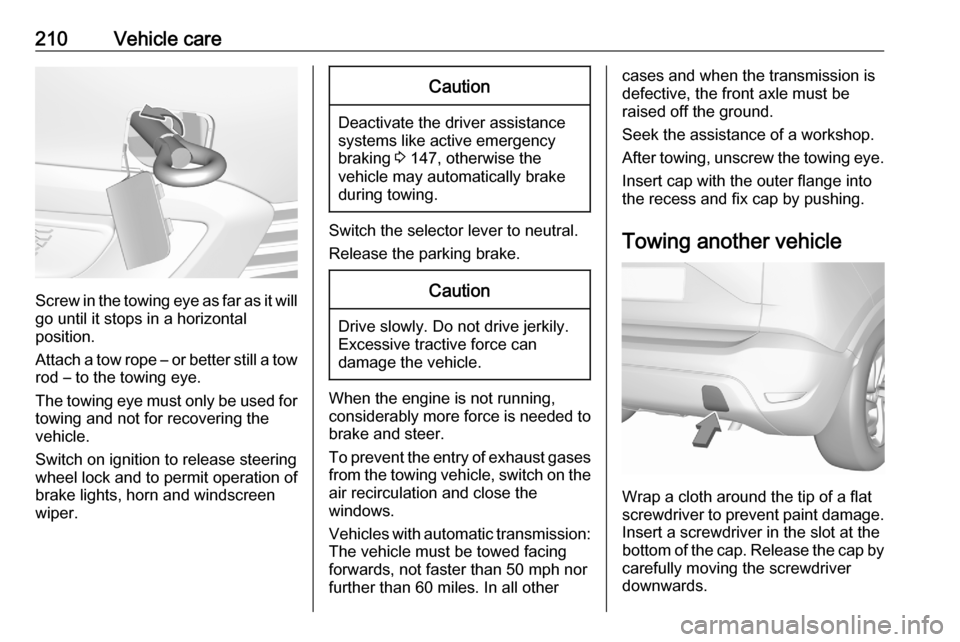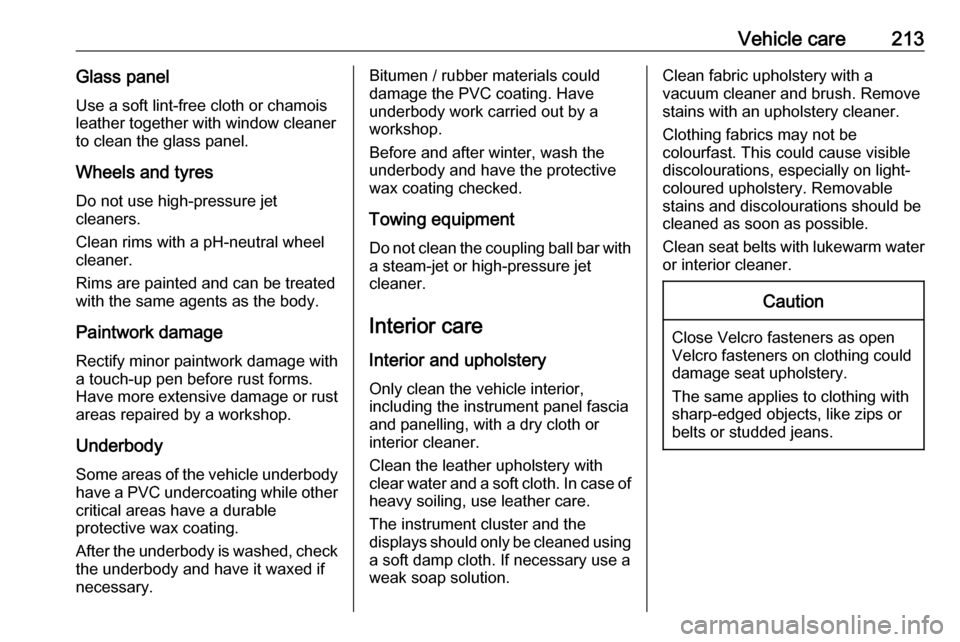tow VAUXHALL CROSSLAND X 2020 Owner's Guide
[x] Cancel search | Manufacturer: VAUXHALL, Model Year: 2020, Model line: CROSSLAND X, Model: VAUXHALL CROSSLAND X 2020Pages: 245, PDF Size: 21.85 MB
Page 209 of 245

Vehicle care207bolts can also be used for the steelspare wheel. In this case, the
spare wheel is secured by the
conical contact of each bolt. In this case, the washers do not come
into contact with the spare wheel.
10. Align the valve hole in the wheel cover with the tyre valve before
installing.
Install wheel nut caps.
11. Stow and secure the replaced wheel and the tools.
12. Check the tyre pressure of the installed tyre and the tightening
torque as soon as possible.
Stowing a damaged full size
wheel in the load compartment
The spare wheel well is not designed
for other tyre sizes than the temporary spare wheel. A damaged full size
wheel must be stowed in the load compartment and secured with a
strap.
Vehicle tools 3 195.To secure the wheel:
1. Position the wheel outside up close to one sidewall of the load
compartment.
2. Place the loop end of the strap through the front lashing eye on
the appropriate side.
3. Place the hook end of the strap through the loop and pull it until
the strap is fastened securely to
the lashing eye.
4. Insert the strap through the spokes of the wheel as shown in
the illustration.
5. Mount the hook to the rear lashing
eye.
6. Tighten the strap and secure it using the buckle.
If no strap is available, make sure to
store the wheel securely in the load
compartment.
Loading information 3 67
Page 210 of 245

208Vehicle care9Danger
Always drive with folded up and
engaged rear seat backrests when stowing a damaged full size wheel
in the load compartment.
Jump starting
Do not start with quick charger.
A vehicle with a discharged vehicle
battery can be started using jump
leads and the vehicle battery of
another vehicle.9 Warning
Be extremely careful when starting
with jump leads. Any deviation
from the following instructions can
lead to injuries or damage caused
by battery explosion or damage to the electrical systems of both
vehicles.
9 Warning
Avoid contact of the battery with
eyes, skin, fabrics and painted
surfaces. The fluid contains
sulphuric acid which can cause
injuries and damage in the event
of direct contact.
● Never expose the vehicle battery
to naked flames or sparks.
● A discharged vehicle battery can already freeze at a temperature
of 0 °C. Defrost the frozen battery before connecting jump leads.
● Wear eye protection and protective clothing when
handling a battery.
● Use a booster battery with the same voltage (12 V). Its capacity
(Ah) must not be much less than
that of the discharged vehicle battery.
● Use jump leads with insulated terminals and a cross section of
at least 16 mm 2
(25 mm 2
for
diesel engines).
● Do not disconnect the discharged
vehicle battery from the vehicle.
● Switch off all unnecessary electrical consumers.
● Do not lean over the vehicle battery during jump starting.
● Do not allow the terminals of one
lead to touch those of the other
lead.
Page 211 of 245

Vehicle care209● The vehicles must not come intocontact with each other during
the jump starting process.
● Apply the parking brake, transmission in neutral,
automatic transmission in P.
Open the positive terminal protection
caps of both vehicle batteries.
Lead connection order: 1. Connect the red lead to the positive terminal of the booster
battery.
2. Connect the other end of the red lead to the positive terminal of the
discharged battery.
3. Connect the black lead to the negative terminal of the boosterbattery.
4. Connect the other end of the black
lead to a vehicle grounding point
of your vehicle in the engine
compartment.
Route the leads so that they cannot
catch on rotating parts in the engine
compartment.
To start the engine: 1. Start the engine of the vehicle providing the jump.
2. After 5 minutes, start the other engine. Start attempts should be
made for no longer than
15 seconds at an interval of
1 minute.
3. Allow both engines to idle for approx. 3 minutes with the leads
connected.
4. Switch on electrical consumers (e.g. headlights, heated rear
window) of the vehicle receiving
the jump start.
5. Reverse above sequence exactly when removing leads.Towing
Towing the vehicle
Wrap a cloth around the tip of a flat
screwdriver to prevent paint damage.
Insert a screwdriver in the slot at the
bottom of the cap. Release the cap by carefully moving the screwdriver
downwards.
The towing eye is stowed with the vehicle tools 3 195.
Page 212 of 245

210Vehicle care
Screw in the towing eye as far as it will
go until it stops in a horizontal
position.
Attach a tow rope – or better still a tow
rod – to the towing eye.
The towing eye must only be used for towing and not for recovering the
vehicle.
Switch on ignition to release steering
wheel lock and to permit operation of
brake lights, horn and windscreen
wiper.
Caution
Deactivate the driver assistance
systems like active emergency
braking 3 147, otherwise the
vehicle may automatically brake during towing.
Switch the selector lever to neutral.
Release the parking brake.
Caution
Drive slowly. Do not drive jerkily.
Excessive tractive force can
damage the vehicle.
When the engine is not running,
considerably more force is needed to
brake and steer.
To prevent the entry of exhaust gases from the towing vehicle, switch on the
air recirculation and close the
windows.
Vehicles with automatic transmission: The vehicle must be towed facing
forwards, not faster than 50 mph nor further than 60 miles. In all other
cases and when the transmission is
defective, the front axle must be
raised off the ground.
Seek the assistance of a workshop. After towing, unscrew the towing eye.
Insert cap with the outer flange into
the recess and fix cap by pushing.
Towing another vehicle
Wrap a cloth around the tip of a flat
screwdriver to prevent paint damage.
Insert a screwdriver in the slot at the
bottom of the cap. Release the cap by carefully moving the screwdriver
downwards.
Page 213 of 245

Vehicle care211The towing eye is stowed with the
vehicle tools 3 195.
Screw in the towing eye as far as it will
go until it stops in a horizontal
position.
The lashing eye at the rear
underneath the vehicle must never be used as a towing eye.
Attach a tow rope – or better still a tow
rod – to the towing eye.
The towing eye must only be used for towing and not for recovering a
vehicle.
Caution
Drive slowly. Do not drive jerkily.
Excessive tractive force can
damage the vehicle.
After towing, unscrew the towing eye.
Insert cap with the upper flange into
the recess and fix cap by pushing.
Appearance care
Exterior care LocksThe locks are lubricated at the factoryusing a high quality lock cylinder
grease. Use a de-icing agent only
when absolutely necessary, as this
has a degreasing effect and impairs
lock function. After using a de-icing
agent, have the locks regreased by a
workshop.
WashingThe paintwork is exposed to
environmental influences. Wash and
wax the vehicle regularly. When using
automatic vehicle washes, select a
programme that includes waxing.
Bird droppings, dead insects, resin,
pollen and the like should be cleaned
off immediately, as they contain
aggressive constituents which can
cause paint damage.
If using a vehicle wash, comply with
the vehicle wash manufacturer's
instructions. The windscreen wiper
Page 215 of 245

Vehicle care213Glass panelUse a soft lint-free cloth or chamoisleather together with window cleaner
to clean the glass panel.
Wheels and tyres Do not use high-pressure jet
cleaners.
Clean rims with a pH-neutral wheel
cleaner.
Rims are painted and can be treated
with the same agents as the body.
Paintwork damage Rectify minor paintwork damage witha touch-up pen before rust forms.
Have more extensive damage or rust areas repaired by a workshop.
Underbody
Some areas of the vehicle underbody
have a PVC undercoating while other critical areas have a durable
protective wax coating.
After the underbody is washed, check
the underbody and have it waxed if
necessary.Bitumen / rubber materials could
damage the PVC coating. Have
underbody work carried out by a
workshop.
Before and after winter, wash the
underbody and have the protective
wax coating checked.
Towing equipment
Do not clean the coupling ball bar with a steam-jet or high-pressure jet
cleaner.
Interior care
Interior and upholstery Only clean the vehicle interior,
including the instrument panel fascia
and panelling, with a dry cloth or
interior cleaner.
Clean the leather upholstery with
clear water and a soft cloth. In case of
heavy soiling, use leather care.
The instrument cluster and the
displays should only be cleaned using
a soft damp cloth. If necessary use a
weak soap solution.Clean fabric upholstery with a
vacuum cleaner and brush. Remove
stains with an upholstery cleaner.
Clothing fabrics may not be
colourfast. This could cause visible
discolourations, especially on light-
coloured upholstery. Removable
stains and discolourations should be
cleaned as soon as possible.
Clean seat belts with lukewarm water or interior cleaner.Caution
Close Velcro fasteners as open
Velcro fasteners on clothing could
damage seat upholstery.
The same applies to clothing with
sharp-edged objects, like zips or
belts or studded jeans.
Page 241 of 245

239Control indicators.......................... 82
Control of the vehicle .................122
Controls ........................................ 70
Convex shape .............................. 33
Coolant and antifreeze ...............219
Cornering lights .......................... 104
Cruise control ...................... 88, 140
Cupholders .................................. 61
Curtain airbag system .................. 53
D Danger, Warnings and Cautions ...4
Daytime running lights ...............104
Declaration of conformity ............231
DEF ............................................ 130
Deflation detection system ...........86
Diesel exhaust fluid ....................130
Diesel fuel system bleeding .......181
Door open .................................... 88
Doors ............................................ 29
Driver alert .................................. 164
Driver assistance systems ..........140
Driver Information Centre .............89
Driving characteristics and towing tips .............................. 169
Driving hints ................................ 122
E Electric adjustment ......................33
Electrical system......................... 191
Electronic climate control system 114Electronic driving programmes ..135
Electronic key system ...................22
Electronic Stability Control and Traction Control system ....85, 139
Electronic Stability Control and Traction Control system off .......86
Emergency call ............................. 99
End-of-life vehicle recovery .......175
Engine compartment fuse box ...191
Engine coolant ........................... 178
Engine coolant temperature ........86
Engine coolant temperature gauge ....................................... 80
Engine data ............................... 225
Engine exhaust .......................... 129
Engine identification ...................222
Engine oil ...........177, 219, 223, 229
Engine oil level monitor ................81
Engine oil pressure ......................87
Entry lighting .............................. 108
Event data recorders ..................234
Exhaust filter ......................... 86, 129
Exit lighting ................................ 108
Exterior care .............................. 211
Exterior light ................................. 87
Exterior lighting ....................12, 101
Exterior mirrors ............................. 33F
Fault ........................................... 135
First aid ......................................... 66
First aid kit ................................... 66
Fixed air vents ........................... 119
Floor mats................................... 214
Folding mirrors ............................. 34
Forward collision alert................. 145
Front airbag system .....................52
Front fog lights .............88, 105, 185
Front pedestrian protection ........149
Front seats.................................... 41
Fuel............................................. 166
Fuel for diesel engines ..............166
Fuel for petrol engines ...............166
Fuel gauge ................................... 80 Fuel tank ..................................... 229
Fuses ......................................... 191
G
Gauges ......................................... 79
Gear selection ........................... 133
Gear shifting ................................. 85
General information ...................169
Glass panel .................................. 38
Glovebox ..................................... 61
H Halogen headlights ....................182
Hand brake ......................... 137, 138
Hazard warning flashers ............104
Page 243 of 245

241QQuickheat ................................... 118
R
Radio Frequency Identification (RFID) ..................................... 237
Radio remote control ...................21
Rain sensor .................................. 88
REACH ....................................... 232
Reading lights ............................ 107
Rear floor storage cover ..............64
Rear fog light ...............88, 106, 186
Rear seats ................................... 45
Rear view camera ...................... 162
Rear window wiper and washer ..73
Recommended fluids and lubricants ........................ 219, 223
Refuelling ................................... 167
Registered trademarks ...............233
Reverse light............................... 186
Reversing lights .........................106
Ride control systems ..................139
Roadside assistance ....................99
Roof .............................................. 38
Roof load ...................................... 67
Roof rack ..................................... 67
S Safety belts ................................... 46
Seat adjustment ....................... 7, 42
Seat belt ........................................ 8Seat belt reminder .......................82
Seat belts ..................................... 46
Seat heating ................................. 44
Seat position ................................ 41
Selective catalytic reduction .......130
Selector lever.............................. 133
Service ............................... 120, 215
Service display ............................ 81
Service information ....................215
Service vehicle soon .................... 84
Side airbag system ......................52
Side blind spot alert ..............88, 158
Sidelights .................................... 101
Side turn lights ........................... 190
Software update ......................... 232
SOS .............................................. 99
Spare wheel ............................... 204
Speed limiter......................... 88, 143
Speedometer ............................... 79
Starting and operating ................122
Starting off ................................... 16
Starting the engine ....................124
Steering ...................................... 122
Steering wheel adjustment ......9, 70
Steering wheel controls ...............70
Stop engine .................................. 84
Stop-start system........................ 126
Storage ......................................... 61
Storage compartments .................61
Sun visor lights .......................... 108Sun visors .................................... 38
Symbols ......................................... 4
System check ............................... 84
T
Tachometer ................................. 80
Tail lights ................................... 186
Three-point seat belt .................... 47
Through-loading facility ................62
Tools .......................................... 195
Tow bar....................................... 169
Towing ................................ 169, 209
Towing another vehicle .............210
Towing equipment .....................170
Towing the vehicle .....................209
Trailer hitch ................................. 169
Trailer towing ............................. 170
Transmission ............................... 16
Transmission display .................133
Tread depth ............................... 198
Trip odometer .............................. 79
Turn lights ............................ 82, 105
Tyre chains ................................ 199
Tyre deflation detection system . 197
Tyre designations ......................196
Tyre pressure ............................ 196
Tyre pressures ........................... 230
Tyre repair kit ............................. 200